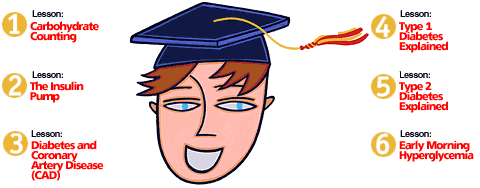



 |
|
|

|
|
Diabetes Lesson 1 - Carbohydrate Counting 
Welcome to Diabetes 201 Carbohydrate Counting! OK So what is it? Good question. In a nutshell, carbohydrate counting is a meal planning system that will help you keep tabs on the carbohydrate in your diet so that you can maintain better control of your blood glucose. As if the health benefits weren't exciting enough, carb counting for short gives you more flexibility and spontaneity in your daily eating. Now, that's something to get excited about! By the end of this lesson, you'll be able to answer the following intriguing questions: How does carbohydrate counting work? How can I get started doing it? What's a good meal plan? How can I measure my carbohydrates? What is the carbohydrate content of some common foods? Assignment #1
Well? How was it? You probably know a lot more than you thought you would about this subject already. If that isn't exactly the case, don't worry because that's what we're here for. Consider us your personal carb counting coaches! Why do we count carbohydrates? What makes carbohydrates so special that we should count them? Why not count fat grams or protein instead? Well, our goal is to maintain blood glucose levels within healthy limits all day, right? As it turns out, very little of the fat you eat (1030%) is converted to glucose and even that can take several hours. Protein has a similar small effect, where about 58% is converted to glucose after 3 to 4 hours. On the other hand, carbohydrates affect your blood glucose the most after meals. Within an hour or so after a meal, more than 90% of the carbohydrate you've just chowed down on becomes glucose. If you test your blood glucose 1 to 2 hours after eating, most of the increase you see comes from the carbohydrate portion of the meal you just ate. So, since carbohydrates raise blood glucose the most, we count them to monitor our intake and maintain healthy blood glucose levels. How does it work? The basic assumption of carbohydrate counting is that if you know your carbohydrate intake, you can reasonably predict where your blood glucose will end up in an hour or so. For people who are controlling diabetes through diet this means that you can use this information to maintain optimum blood glucose levels. For people taking insulin, you can eventually match your insulin to the amount of carbohydrate you are eating. With some knowledge and practice, you'll be a carb counting superstar. So, let's get started Get thee to a dietician To safely embark upon a program of carbohydrate counting, it is wise to visit a registered dietician and/or a certified diabetes educator. He or she can work with you to help determine how many calories you need each day based on your height, weight and activity level, while taking into account (thankfully) your favorite foods, cultural background and lifestyle. Together, you will figure out the total number of carbohydrate grams you can have each day your carbohydrate allowance and how to distribute them evenly throughout the day. Page 1 2 3 Copyright © 1999-2026 savvyHEALTH.com. All rights reserved.
|
|
|
||||||||||||||||
|
About savvyHEALTH | Privacy | Feedback | Home
http://www.savvyHEALTH.com/
All contents copyright © 1999-2026 savvyHEALTH, Inc. All rights reserved.
This internet site provides information of a general nature and is
designed for educational purposes only. If you have any concerns about
your own health, you should always consult
with a physician or other healthcare professional. Please review the Terms of Use before using this site. Your use of the site indicates your agreement to be bound by the Terms of Use.
|
|